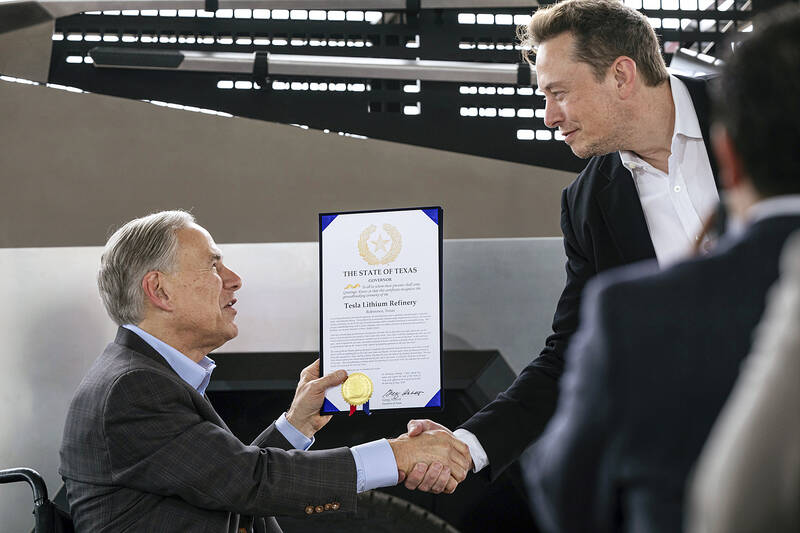Twitter Inc boss Elon Musk on Tuesday put out word that audio and video calls are coming to the platform.
“Coming soon will be voice and video chat from your handle to anyone on this platform,” Musk wrote on Twitter.
“So you can talk to people anywhere in the world without giving them your phone number,” he wrote.

Photo: AP
WHATSAPP?
In a subsequent comment on Twitter, Musk contended that the WhatsApp messaging service operated by Meta Platforms Inc “cannot be trusted.”
A messaging feature at Twitter would compete with an array of free services, including Messenger, Signal, Telegram and WhatsApp.
Musk added that starting yesterday, Twitter would encrypt direct messages on the platform, scrambling contents to safeguard privacy.
Since buying Twitter for US$44 billion late last year, Musk has implemented changes in seemingly impulsive ways, sometimes causing chaos for users.
The Twitter boss has talked publicly of building an all-purpose “X” application that combines messages, payments and more.
Musk recently made the tech firm part of an “X” shell corporation, getting rid of the Twitter company name, but continuing to use it for the service.
GUILTY HACKER
Separately, a British man on Tuesday pleaded guilty for his role in schemes to hack the Twitter accounts of celebrities like Musk and former US president Barack Obama, and stealing US$794,000 in cryptocurrency.
Joseph James O’Connor, 23, entered his guilty plea in a New York court after being extradited from Spain on April 26.
He was arrested nearly two years ago in Spain for the July 2020 hack of more than 130 Twitter accounts, including those of Apple Inc, Uber Technologies Inc, Kanye West, Bill Gates and US President Joe Biden.
He and others in his hacking group hijacked the accounts and asked the owners’ followers to send them bitcoin, promising to double their money.
O’Connor, who went by the online name of PlugwalkJoe, pleaded guilty to multiple counts of computer intrusion, extortion, stalking, wire fraud and money laundering.
The most serious of the charges brings up to 20 years in prison.

Intel Corp chief executive officer Lip-Bu Tan (陳立武) is expected to meet with Taiwanese suppliers next month in conjunction with the opening of the Computex Taipei trade show, supply chain sources said on Monday. The visit, the first for Tan to Taiwan since assuming his new post last month, would be aimed at enhancing Intel’s ties with suppliers in Taiwan as he attempts to help turn around the struggling US chipmaker, the sources said. Tan is to hold a banquet to celebrate Intel’s 40-year presence in Taiwan before Computex opens on May 20 and invite dozens of Taiwanese suppliers to exchange views

Application-specific integrated circuit designer Faraday Technology Corp (智原) yesterday said that although revenue this quarter would decline 30 percent from last quarter, it retained its full-year forecast of revenue growth of 100 percent. The company attributed the quarterly drop to a slowdown in customers’ production of chips using Faraday’s advanced packaging technology. The company is still confident about its revenue growth this year, given its strong “design-win” — or the projects it won to help customers design their chips, Faraday president Steve Wang (王國雍) told an online earnings conference. “The design-win this year is better than we expected. We believe we will win

Chizuko Kimura has become the first female sushi chef in the world to win a Michelin star, fulfilling a promise she made to her dying husband to continue his legacy. The 54-year-old Japanese chef regained the Michelin star her late husband, Shunei Kimura, won three years ago for their Sushi Shunei restaurant in Paris. For Shunei Kimura, the star was a dream come true. However, the joy was short-lived. He died from cancer just three months later in June 2022. He was 65. The following year, the restaurant in the heart of Montmartre lost its star rating. Chizuko Kimura insisted that the new star is still down

While China’s leaders use their economic and political might to fight US President Donald Trump’s trade war “to the end,” its army of social media soldiers are embarking on a more humorous campaign online. Trump’s tariff blitz has seen Washington and Beijing impose eye-watering duties on imports from the other, fanning a standoff between the economic superpowers that has sparked global recession fears and sent markets into a tailspin. Trump says his policy is a response to years of being “ripped off” by other countries and aims to bring manufacturing to the US, forcing companies to employ US workers. However, China’s online warriors